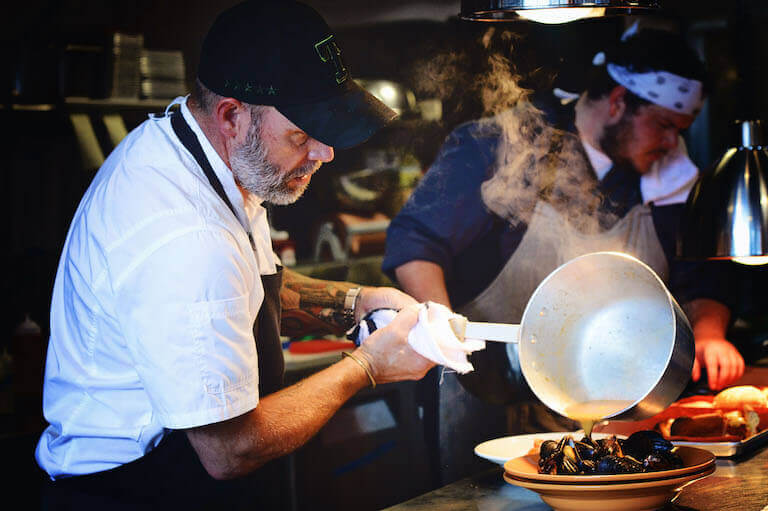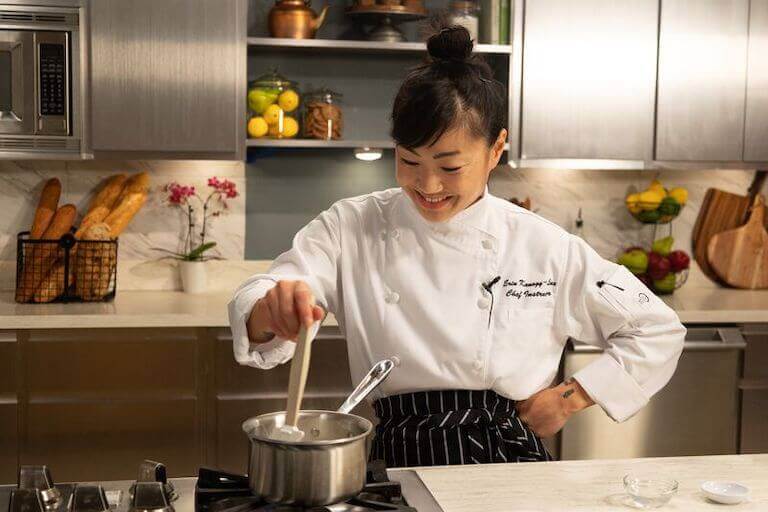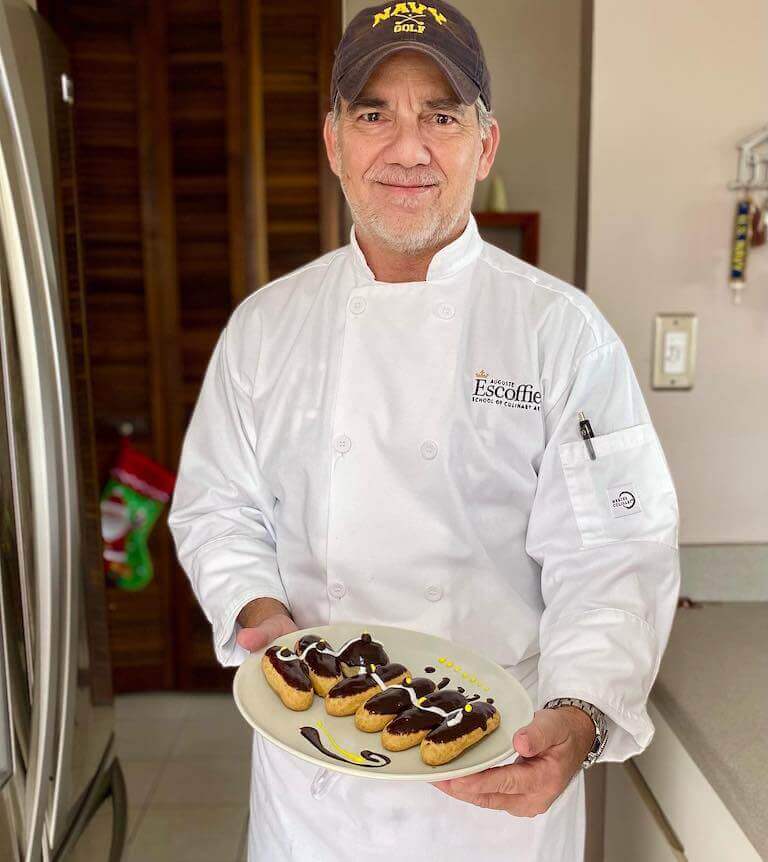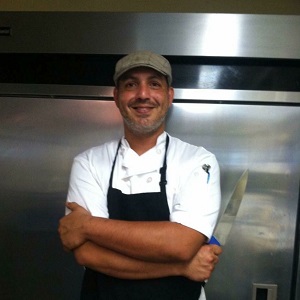Listen to This Article:
Starting something new as an adult can be challenging. But if you’re asking yourself, “Am I too old to become a chef?” know this: you haven’t missed your chance. There are Auguste Escoffier School of Culinary Arts graduates who began their careers in their 30s and 40s and beyond and went on to successful futures!
As we get older, we gain new experiences and discover more about ourselves. Sometimes, we realize the career path we once chose just isn’t cutting it anymore. All those life experiences are like secret ingredients that make your story richer and your skills stronger, setting you up for a fulfilling career change.
But this passing time can also make us doubt ourselves when it comes to starting a new career. Can we keep up with the 20-somethings that we’ll be competing with? Do we still have what it takes? Is it even worth it, knowing that we don’t have as much time to build our careers?
Discover what’s truly possible for you in the culinary industry, no matter where you are in life.
Is There an Age Cutoff for Becoming a Chef?
No one is too old for culinary school! At Escoffier, we have students ages 18 and up, with all levels of experience, and from all walks of life. Some of these students share your goal of becoming a chef, while others are pursuing alternative culinary paths. Escoffier graduate and winner of the prestigious Cochon 555 competition, Lance McWhorter, for example, got serious about cooking after his military service and didn’t become a chef or attend culinary school until he was in his 40s.

Escoffier graduate, military veteran, Cochon 555 winner and Culture ETX owner Lance McWhorter
You’re likely to work alongside students who are fresh out of high school, experienced chefs who want to take their cooking to the next level, home cooks who want to start their own businesses, and more. There are many careers that are supported by a culinary education, and you shouldn’t let concerns over age stop you from getting that credential.
Graduate Coy Pierce began culinary school at Escoffier in his late 40s. He said, “I was worried I was going to be the oldest person there [in online culinary school]. No. There were three people older than me. One had retired as a printer salesman. One had been retired for 15 years and got bored and decided he wanted to try his hand at culinary. The other gentleman was a Bronze Star recipient who had just retired out of the U.S. Army.”*
So, it’s highly likely that you can find both younger and older students working alongside you as you pursue your degree or diploma.
*Information may not reflect every student’s experience. Results and outcomes may be based on several factors, such as geographical region or previous experience.
Other Career Paths in the Culinary Industry
Do keep in mind—becoming a restaurant chef can be a physically challenging career path. So, while there is no age limit, this path can require long hours on your feet, which can become more difficult as you get older. Some older chefs may choose to become personal chefs or research chefs, which might be some great alternative options.
In addition to working as a professional chef, there are plenty of other rewarding career paths in the culinary world. Some of these roles include:
- Catering: You may find that you have more control over your schedule as a caterer, working to prepare meals for events of all sizes.
- Food Stylist: You can combine creativity with technical skills as a food stylist, helping make food appear as delicious as it tastes for photo shoots, advertisements, and cookbooks.
- Recipe Developer: You can use your culinary knowledge to create new and exciting dishes for restaurants, cookbooks, magazines, or food companies.
- Culinary Instructor: You can share your passion for cooking with others by teaching culinary classes in-person or online.
How Long Does It Take to Become a Chef?
The time it takes to become a chef differs for everyone. It’s impossible to say how long it will take any individual to get the promotions they’ll need to rise through the ranks. Remember, attending culinary school does not make someone a chef. However, it may give them many of the skills they could need in the future as they pursue that title.
Timeline to Becoming a Chef
- Culinary School: Earning a culinary diploma or degree can take anywhere from 6 months to 2 years. Escoffier offers diploma and degree programs that can fit different schedules, whether you want to move quickly or desire additional education.
- Entry-Level Experience: After culinary school, most aspiring chefs start with entry-level roles such as prep cook or line cook. This stage can take around 1 to 3 years as you build upon your foundational skills in a professional kitchen.
- Advancing in the Kitchen: Moving up the ranks to become a sous chef can take another 2 to 5 years. This step often involves learning management skills and deepening your culinary expertise.
- Becoming an Executive Chef: To reach the title of executive chef, it can take around 10 to 15 years of experience, depending on your dedication, skill development, and opportunities.
Remember, the timeline varies for everyone. You may be able to move faster with dedication and the right opportunities. The important thing is that every step in the journey is valuable and contributes to your growth as a chef.
After school, aspiring chefs can begin working in the culinary industry. They may start in an entry-level prep cook position or similar role, and begin working their way up the ranks to line cook, supervisor, sous chef, or executive chef.

Learning proper technique from experienced instructors is a vital first step in any aspiring chef’s culinary journey.
Overall, this progression can take several years. Some graduates find that their degree or diploma can help them to move forward quickly. Escoffier graduate Damian Palacios says, “I think my career is on a faster track because of culinary school. Back when I started working, the supervisor was there to help me out. But now they ask for my opinion on how to do things.”*
So it’s possible that investing the time in culinary school on the front end of your career could help you reach your career goals months or even years earlier. The time is going to pass whether you pursue your culinary dreams or not. So, it’s better for them to pass while you’re working in an industry you love and reaching for a title you want rather than feeling stuck in the same unfulfilling career you’re in right now!
*Information may not reflect every student’s experience. Results and outcomes may be based on several factors, such as geographical region or previous experience.
I Have To Keep Working Full Time…So How Can I Attend Culinary School?
It’s one thing for an 18- or 20-year-old to devote weeks or months exclusively to their education. But what if you’re 35 and have a family to provide for? Or a mortgage to pay? You don’t necessarily have the option to quit your job and dedicate yourself 100% to culinary school.
So many people find themselves in this position. In the past, this problem kept many otherwise qualified culinary school candidates away from formal education.
But now, online culinary school can be the answer. Escoffier’s online programs can give adult students the flexibility they need to continue working and stay present with their families while also getting that school credential. Graduate Rhonda Adkins attended Escoffier’s online program in her early 50s while working full-time, running her blog, and raising six children!
*Information may not reflect every student’s experience. Results and outcomes may be based on several factors, such as geographical region or previous experience.
Students watch instructional videos and complete their cooking assignments in their home kitchens, on their own schedule (as long as they meet class deadlines). Do your classwork on Sunday morning while the kids are relaxing, or turn an entrée assignment into a family dinner. There are also live lessons, assignments to submit, and ongoing feedback from professional Chef Instructors.
Modern technology has allowed us to access an education that was once the domain only of a privileged few. There’s no reason why an online curriculum shouldn’t benefit students of all ages.

Escoffier online student Luis R. practicing éclairs
Online students at Escoffier will also have someone in their corner in the form of a Success Coach. These coaches may provide support and supplemental resources to help students excel in their programs. For older students who may be adjusting to the school environment for the first time in years, these helpers can be an invaluable source of support and guidance!
Practical Tips for Transitioning into the Culinary Industry Later in Your Career
If reading this has you excited to get started on your new career path, here are some tips to help you in the transition:
- Choose a Schedule that Works for Your Life: As mentioned above, there are flexible ways to attend culinary school and get started working toward a career as a chef. Consider an online program to allow yourself that flexibility with the other time requirements in your life.
- Network with Those in the Industry: Talk to others who are already working in the culinary industry. Attend local food events, festivals, and workshops. Connect with others, offer assistance when you can, and ask for guidance when needed.
- Practice at Home: The more comfortable you are in the kitchen, the more it can help you ease into culinary school and a culinary career. Spend time practicing new techniques and using ingredients you may not be used to using.
- Take Care of Your Health Throughout the Process: The culinary world can be demanding. So, make sure you take time to take care of yourself. Stay active, eat well, and make sure you’re getting enough rest.
- Embrace Lifelong Learning: The culinary world is constantly evolving, so it’s important to stay open to learning new skills throughout your career.
If You Always Do What You’ve Always Done, You Always Get What You’ve Always Gotten
Change can be hard. And it can get even harder as we get older. We become more set in our ways and may feel that we have more to lose.
But adulthood does not—and should not—equal stagnation. Adults who are brave enough to try something new often find that the rewards are well worth it. You are NOT too old to become a chef. With hard work and the right education, you have just as good a chance as anyone else of achieving your dreams.
Explore all of our culinary arts programs to see which ones are the best fit for you and your goals!
TO READ MORE ABOUT THE PATH OF ADULT CULINARY STUDENTS, TRY THESE ARTICLES NEXT:
- Amy Kimoto-Kahn: Why a Published Author, Food Blogger, and Chef Returned to Culinary School
- How to Become a Chef: The Complete Guide
- How Older Workers Can Change Careers and Enter the Culinary Industry
*Information may not reflect every student’s experience. Results and outcomes may be based on several factors, such as geographical region or previous experience.
This article was originally published on April 28, 2022, and has since been updated.




